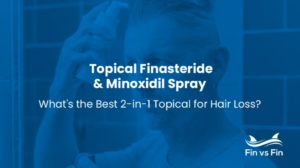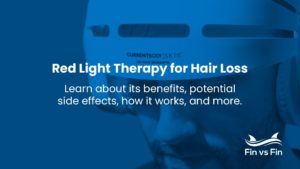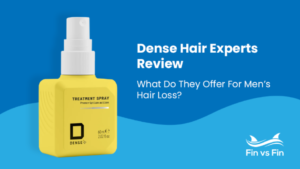Key Takeaways
- While some studies do show a potential association between high blood pressure and hair loss, more research is still needed.
- High blood pressure can affect blood flow, potentially impacting blood flow to the scalp and hair follicles.
- Some medications used to treat high blood pressure may lead to hair loss as a side effect.
- Hair loss is influenced by various factors, including genetics, hormones, stress, certain conditions, medications, lifestyle, and more.
- The reversibility of high blood pressure-related hair loss depends on various factors; a comprehensive approach that involves your healthcare provider is necessary.
While there is no direct and universally established link between high blood pressure (hypertension) and hair loss, some studies do suggest a potential association. A study often cited for this connection was conducted in 2007 on assigned males, however, the sample size was notably small. Other, more robust studies, have not found a significant association between high blood pressure and hair loss thus far.
High blood pressure can affect blood flow to various parts of the body, including the scalp, which may influence hair health. Reduced blood flow to hair follicles could contribute to hair thinning or loss.
Additionally, some medications used to treat high blood pressure, such as beta-blockers or angiotensin-converting enzyme (ACE) inhibitors, have been implicated in hair loss as a side effect. However, individual responses may vary, and other factors like genetics, hormonal changes, and lifestyle factors may also play significant roles in hair loss.
In this article, we’ll discuss blood pressure and hair loss, what factors contribute to hair loss, and possible treatments. In addition, we spoke with Dr. Jonathan Rick, a board-certified dermatologist, about the most effective hair loss treatments.

Can Blood Pressure Cause Hair Thinning?
Scientific evidence is inconclusive when it comes to directly linking high blood pressure to hair thinning. While some studies have explored the potential relationship between vascular health and hair loss, the evidence remains speculative, and more research is needed to establish a clear connection.
Some research has noted that:
- Abdominal obesity, blood pressure, and smoking has been shown to be significantly higher among those with early-onset male pattern hair loss
- The risk factors for heart disease are more prevalent among individuals with early-onset male pattern hair loss
- Early-onset pattern hair loss may have no significant association with certain risk factors such as high blood pressure, increased waist circumference, body mass index (BMI), and more
Hair loss is a complex phenomenon influenced by various factors, including genetics, hormonal changes, nutritional status, and lifestyle. The role of blood pressure in hair health is not fully understood, individual responses may vary, and more research is still needed.
Which High Blood Pressure Medications Cause Hair Loss?
Hair loss can be a side effect of certain medications used to treat high blood pressure. Not everyone experiences this side effect, and its occurrence can vary from person to person.
Some high blood pressure medications that have been associated with hair loss include:
- Beta-blockers, such as propranolol and atenolol, have been reported to cause hair loss in some individuals. These medications are commonly prescribed to lower blood pressure and reduce the workload on the heart.
- ACE inhibitors, like enalapril and lisinopril, are another class of medications used to treat hypertension. Some people have reported hair loss as a side effect.
It’s important to note that not everyone using these medications will experience hair loss, and the side effect is generally considered rare.
If you are concerned about hair loss related to your high blood pressure medication, it’s crucial to consult with your healthcare provider. Always follow your healthcare provider’s recommendations and never stop or change your medication without their supervision.
Is Hair Loss From High Blood Pressure Reversible?
Hair loss related to high blood pressure is a complex issue, and the reversibility depends on various factors. In some cases, addressing the underlying cause of high blood pressure or adjusting medications may contribute to improved hair health, but this isn’t a guaranteed solution for everyone.
If the hair loss is a side effect of certain medications prescribed for hypertension (such as beta-blockers or ACE inhibitors), your healthcare provider may consider alternative medications with fewer side effects on hair.
However, it’s essential to recognize that other factors, such as genetics, hormonal changes, and lifestyle choices, also play significant roles in hair loss. Therefore, the reversibility of hair loss related to high blood pressure may vary from person to person.
How to Treat Hair Loss From High Blood Pressure
If you suspect that your hair loss is related to high blood pressure or its associated medications:
- Consult with your healthcare provider: Schedule an appointment with your healthcare provider or dermatologist to discuss your concerns about hair loss. Be open about your symptoms, any changes in medication, and other factors that might contribute to hair loss.
- Discuss medication adjustment: If your healthcare provider determines that your high blood pressure medication may be contributing to hair loss, they might consider adjusting the dosage or prescribing an alternative medication with fewer side effects on hair.
- Discuss nutritional support: Ensure a well-balanced diet rich in nutrients that support hair health, including iron, zinc, vitamin D, and vitamin B12. Your healthcare provider may recommend supplements if deficiencies are identified.
- Consider scalp care: Gentle hair care practices, such as using a mild shampoo and conditioner, and avoiding excessive heat, can help minimize damage to the hair.
- Consider lifestyle modifications: Regular exercise, a balanced diet, and stress management contribute to overall well-being, which can positively impact hair health.
- Consider hair loss treatments: Some individuals may benefit from hair loss treatments containing minoxidil or finasteride, both FDA-approved to treat certain types of hair loss. In addition, some individuals may also speak with their healthcare provider about laser caps, a non-invasive hair loss treatment.

A Word From Our Expert
- Dr. Jonathan Rick
There is a wealth of data supporting topical and oral minoxidil for the treatment of hair loss. Oral finasteride also has a proven track record of efficacy. When used exclusively for hair loss, low doses appear to be effective. The efficacy of the topical and oral formulations appears to be similar when used consistently. Both minoxidil and finasteride should be applied twice a day when used topically. The oral preparations of both finasteride and minoxidil are safe in most people. Regardless of how the products are combined, using both finasteride and minoxidil is very effective at preventing hair loss.”
What Blood Pressure Medications Regrow Hair?
Minoxidil was initially developed as a medication to treat high blood pressure. However, during clinical trials, researchers discovered an unexpected side effect: hair growth. As a result, minoxidil was repurposed and later marketed as a topical treatment for pattern hair loss.
In the context of treating high blood pressure, minoxidil is not typically used as a first-line medication due to its potential side effects and the availability of other, more commonly prescribed antihypertensive medications. When used for blood pressure, minoxidil is usually reserved for cases where other medications have not been effective.
For hair loss treatment, minoxidil is available over-the-counter in topical formulations, such as a solution or foam. If you are considering using minoxidil for hair loss, it’s important to follow the instructions provided with the product and consult with a healthcare professional for guidance, especially if you have any pre-existing health conditions.

A Word From Our Expert
- Dr. Jonathan Rick
Topical minoxidil is a cost-effective treatment for several types of hair loss. This was initially sold as Rogaine, but there are several generic alternatives on the market now. There is a wealth of data and experience showing that this is an effective product, especially for androgenic alopecia.”
Other Factors That Contribute to Hair Loss
Hair loss is influenced by various factors:
- The most common cause of hair loss is a hereditary condition called androgenic alopecia, or pattern baldness.
- Changes in hormones due to pregnancy, childbirth, menopause, and thyroid conditions can contribute to hair loss.
- Conditions such as alopecia areata, lupus, diabetes, and polycystic ovary syndrome (PCOS) can lead to hair loss.
- Certain medications, including chemotherapy drugs, blood thinners, and medications for arthritis, depression, and high blood pressure, can cause hair loss as a side effect.
- Physical or emotional stress from surgery, illness, or trauma can lead to temporary hair loss.
- Insufficient intake of certain nutrients, such as iron, zinc, vitamin D, and vitamin B12, can impact hair health.
- Excessive use of hair styling tools, chemical treatments, and certain hairstyles may damage the hair and contribute to hair loss.
- Hair naturally thins and loses density as part of the aging process.
Related reading: Can Vaping Cause Hair Loss?
What Blood Problems Cause Hair Loss?
Iron deficiency anemia occurs when the body doesn’t have enough iron to produce an appropriate amount of hemoglobin, the protein responsible for carrying oxygen in red blood cells. This condition can lead to a range of symptoms, including fatigue, weakness, paleness, and hair loss. The reduced iron levels affect the supply of oxygen to the hair follicles, leading to weakened hair structure and increased shedding.
Addressing iron deficiency through dietary changes, iron supplements, or other medical interventions may help improve both the condition and associated hair loss symptoms.
Summary
While some studies suggest a potential association between high blood pressure and hair loss, more research is needed. High blood pressure can impact blood flow to the scalp, potentially contributing to hair thinning, and certain medications used for this condition may lead to hair loss as a side effect. Responses to high blood pressure and its treatment vary among individuals, and other factors like genetics, hormones, nutritional deficiencies, medications, and lifestyle may also contribute to hair loss.
Treatment approaches for high blood pressure-related hair loss involve consulting with your healthcare provider, considering medication adjustments, reducing stress, using hair loss treatments like minoxidil, and more.
Frequently Asked Questions (FAQs)
What is the main cause of excessive hair loss?
Excessive hair loss may be caused by hormonal changes, genetics, certain autoimmune conditions, certain medications, stress, and more.
What illnesses or conditions cause hair loss in assigned females?
Hair loss in assigned females can be associated with various conditions, such as PCOS, menopause, iron deficiency anemia, androgenic alopecia, and more.
What drugs make you lose your hair?
Hair loss can be a side effect of various medications, including chemotherapy drugs, blood thinners, antidepressants, high blood pressure medications, immunosuppressants, and more.
What does hair loss indicate?
Hair loss can indicate various underlying factors, and its causes are diverse. Some common reasons for hair loss include genetics, aging, hormone shifts, medical conditions, nutritional deficiencies, physical and emotional stress, and more. If you’re experiencing hair loss, be sure to reach out to your healthcare provider.
Curious where to start?
We’ve personally tested hundreds of hair regrowth products for men. Find out which work best (and enjoy exclusive discounts!) in our hair loss newsletter.

Related Reading

Topical Finasteride and Minoxidil Spray Review – What’s the Best 2-in-1 Topical for Hair Loss?
If you’ve been looking into treatment for pattern hair loss (androgenic alopecia), you may have come across the ingredients minoxidil and finasteride, which are the two most popular and clinically-backed treatments for thinning hair that come in both oral and topical form. Brands like Hims,

Tretinoin and Hair Loss: Does It Help Regrow Hair?
Key Takeaways Topical tretinoin may support hair growth by increasing circulation to the scalp and boosting cell turnover. Up-to-date clinical research indicates that tretinoin can enhance the effects of minoxidil for hair growth. The most common side effects of tretinoin are skin irritation, dryness, and

Red Light Therapy for Hair Loss: Does It Promote ReGrowth?
Key Takeaways Red light therapy can safely and effectively treat hair loss in some individuals. It typically takes four to six months to see results from red light therapy. Red light therapy can promote regrowth and hair retention. While many types of red light therapy

Hers vs. Rogaine vs. Nutrafol: Which Is Best for Hair Loss?
Our Top Picks Best for Comprehensive Hair Care: Hers, Amazon | Jump to Review Best for Convenient Accessibility: Rogaine, Amazon | Jump to Review Best for Natural Ingredients: Nutrafol, Amazon | Jump to Review Hers, Rogaine, and Nutrafol are all brands that offer hair loss treatments

How to Get Oral Minoxidil Online: A Complete Guide
Key Takeaways Oral minoxidil is a good option for individuals with androgenic alopecia who experience side effects from topical minoxidil or who are not seeing the results they hoped for. You can get an oral minoxidil prescription online by completing a virtual consultation with a

Dense Hair Experts Review: What Do They Offer for Men’s Hair Loss?
Dense Hair Experts Overview Price: £59.99 (or £47.99 on subscription) Prescription products: Finasteride, dutasteride OTC products: Minoxidil, shampoo, conditioner, vitamins, styling products Active ingredients: Finasteride, dutasteride, minoxidil Potential side effects: Itching, redness, flaking Who it’s best for: Individuals experiencing male pattern baldness Go to Site→














